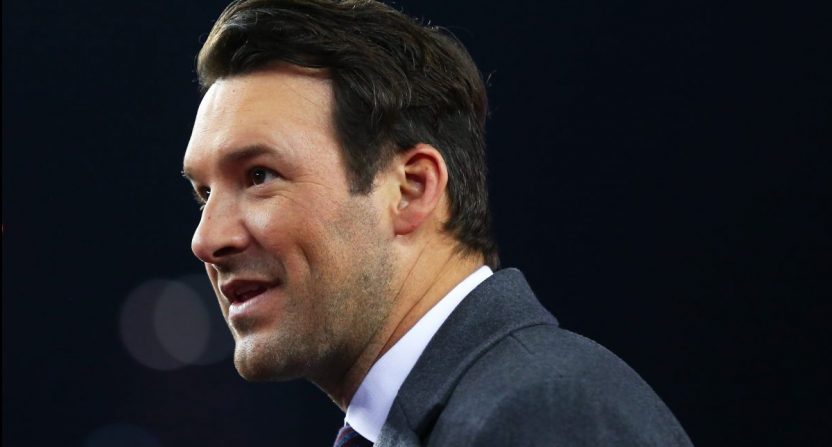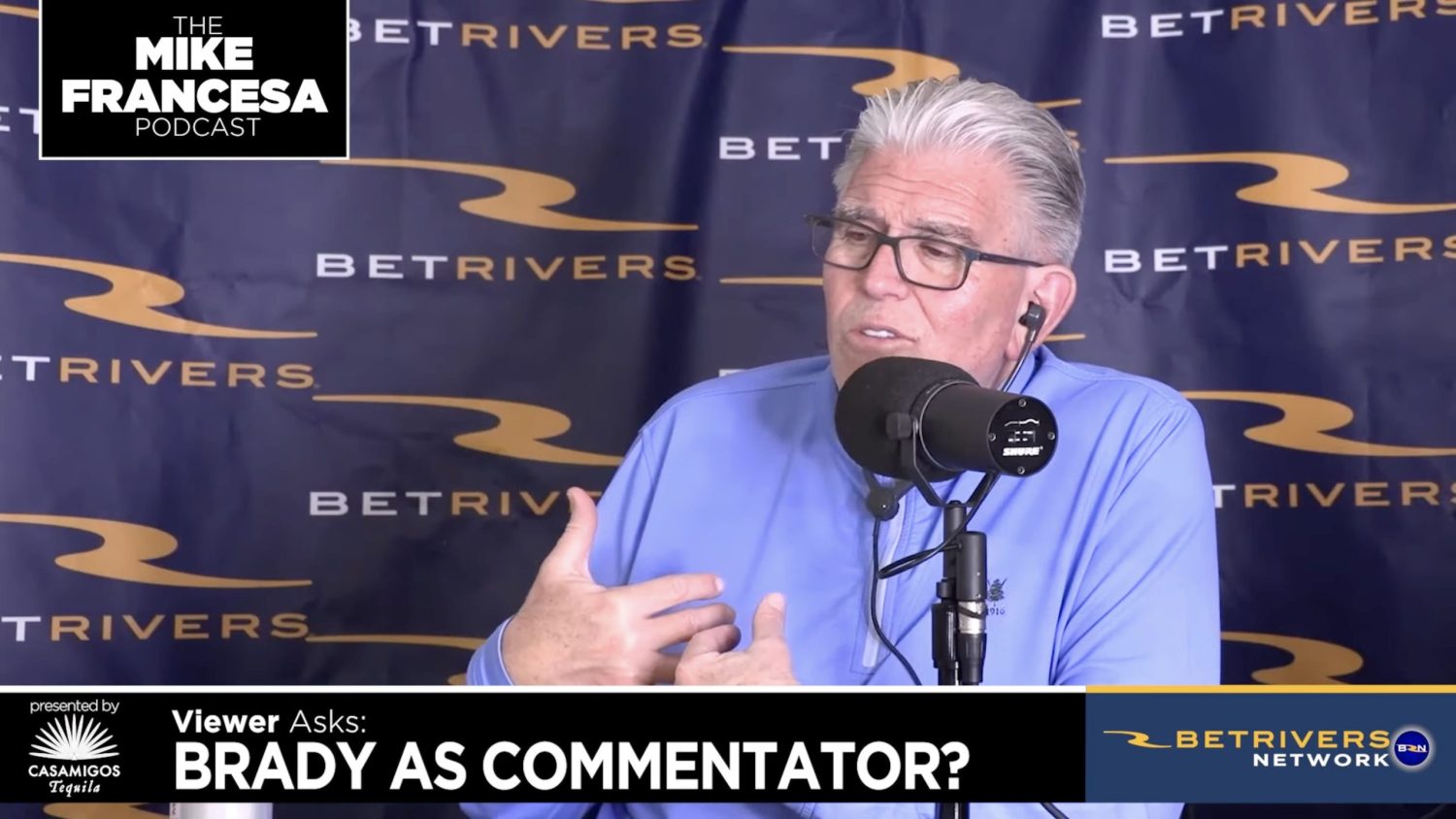The NFL season is here, which means it’s time to welcome Tony Romo back into our lives. Once touted as a rising star in sports media (with the salary to prove it), the former Cowboys quarterback enjoyed a spectacular debut upon his arrival in the CBS broadcast booth, distinguishing himself with charisma and cogent analysis. Romo’s insight, often predicting plays before they happened, made him an instant fan favorite, a larger-than-life personality poised to become one of the most respected and influential voices of his era.
And while Romo still occupies precious real estate as Jim Nantz’s weekly copilot, he’s developed his share of bad habits, reduced to a caricature of the broadcaster he once was. Veering too much into shtick with awkward tangents unrelated to the game, Romo’s regression concerned network executives enough to stage an “intervention” last fall, pleading for the 43-year-old to recommit himself amid what had been an embarrassing series of blunders.
Romo isn’t the first and surely won’t be the last commentator to see his career stagnate after a period of early success, his focus and attention to detail disappearing in a thick cloud of complacency. Citing a perceived lack of preparation and a clumsy reliance on catchphrases and onomatopoeia, Romo has invited criticism from media members including Colin Cowherd and Dick Ebersol, the latter suggesting the CBS analyst had “lost his passion” for broadcasting.
“He’s an unbelievably engaging guy, he should have been a terrific, great broadcaster,” Ebersol lamented in an interview with Chris Wallace. “Something’s happened since he got into that chair. And it doesn’t seem like he’s into it. Like he was on his way up. He does not seem to be the storyteller that he should be.”
That’s one theory, though others—namely Cowherd—suspect another culprit, assigning blame to Romo’s extracurricular activities including a golf habit that started as a hobby but soon grew into an obsession, distracting from his duties at CBS.
Needless to say, the narrative surrounding Romo has changed dramatically, no longer benefiting from built-in excuses like growing pains or the steep learning curve all novice broadcasters are afforded. As polished and camera-ready as any newcomer in recent memory, Romo’s curse is that he set the bar too high, drowning under the weight of unrealistic expectations.
What’s so frustrating about Romo, as he enters his seventh season under the CBS umbrella, is that we know how good he is, a charming, likeable presence who, when fully invested, can elevate a broadcast with his deep knowledge of the quarterback position and how offenses operate. That brilliance was on full display during the 2018 AFC Championship Game between New England and Kansas City, a performance widely lauded as Romo’s masterpiece, practically willing plays into existence with his clairvoyant wizardry.
.@TonyRomo was calling plays before they happened! 🔮 pic.twitter.com/4jdm9I8Pl5
— NFL (@NFL) January 22, 2019
Romo has heard your complaints, though it doesn’t sound like he’s fazed by them, dismissing his critics as click-thirsty trolls desperate for attention.
“There are agendas. People like clicks,” Romo expressed to The Athletic when the subject was raised by Richard Deitsch last month. “Our job is to go out there and perform like we’ve done and try to always do our best. I think we’ve done a great job with that.”
Romo would frame this as “taking the high road,” though his deflection tactics are all too transparent, living in an unflinching state of denial, unwilling to acknowledge his portrayal as a flawed broadcaster at a career crossroads. Some accountability would be nice, though, really, what incentive does Romo have to do anything more than the bare minimum?
If Romo doesn’t seem as hungry or eager to impress as he did when CBS first hired him, it’s because he’s not. Job security is no obstacle—he signed a 10-year deal with CBS that runs through 2030. His pockets are flush with endorsement money from Sketchers, Michelob and Subway. And while viewers are free to change the channel if they so choose, they likely won’t, helpless to kick their crippling addiction to America’s favorite sport, in all its pageantry and violence (though perhaps they’ll watch it on mute or at a bar to avoid Romo’s grating commentary).
Football represents quite the paradox, in that sense. It’s a popular enough commodity that fans will tune in regardless of who’s calling the game, yet networks continue to splurge on splash hires like Romo and Tom Brady, conflating fame and star power with quality. Not that that distinction matters much. The NFL always wins, an impenetrable juggernaut too big to fail.
Fortunately, Romo isn’t a lost cause, at least not yet. A career reinvention is well within the realm of possibility. This video should serve as a useful exercise, demonstrating how Joe Buck has grown as a broadcaster, tirelessly honing his craft over decades. Notice how Buck’s style has evolved, becoming more confident and assertive over time, rising to the moment without overshadowing it. In making those strides, Buck was able to overcome his reputation as “overrated” or a product of nepotism, establishing himself as the preeminent play-by-play voice of his generation.
One of my favorite quotes from Tim Robinson’s wonderfully chaotic Netflix show, I Think You Should Leave, is from Season 1’s “Baby of the Year” sketch, when a visibly annoyed Sam Richardson mutters, “They don’t stay babies forever, idiot.” It’s a delightfully absurd quip punctuated by Richardson’s exasperated line reading, but also a metaphor for our flavor-of-the-month culture, quick to adopt new trends while dispensing of old ones without a second thought. That shiny new toy is Fox phenom Greg Olsen, a fresh face for the masses embodying many of the same traits that made Romo popular early in his CBS tenure.
Romo may have been the gold standard, but others in the industry caught up to him, raising the bar while Romo rested on his laurels, content to let his competitors do the heavy lifting. There’s no handbook or formula for being an effective color commentator, though the ones who last tend to choose their spots wisely, chiming in with amusing anecdotes and relevant observations without hijacking the broadcast. That balance has eluded Romo, too often defaulting to class clown with half-formed thoughts that probably would have been better left unsaid. The “Romostradamus” parlor trick was bound to lose its novelty at some point, though Romo never bothered to replace it with anything, getting by on smoke and mirrors without improving his repertoire.
Viewed as a sunk cost, Romo will presumably keep his job through the length of his contract. But he’s still a competitor with something to prove. Will Romo fight to restore his reputation, or is he destined to be another cautionary tale of wasted potential? The choice is his.







